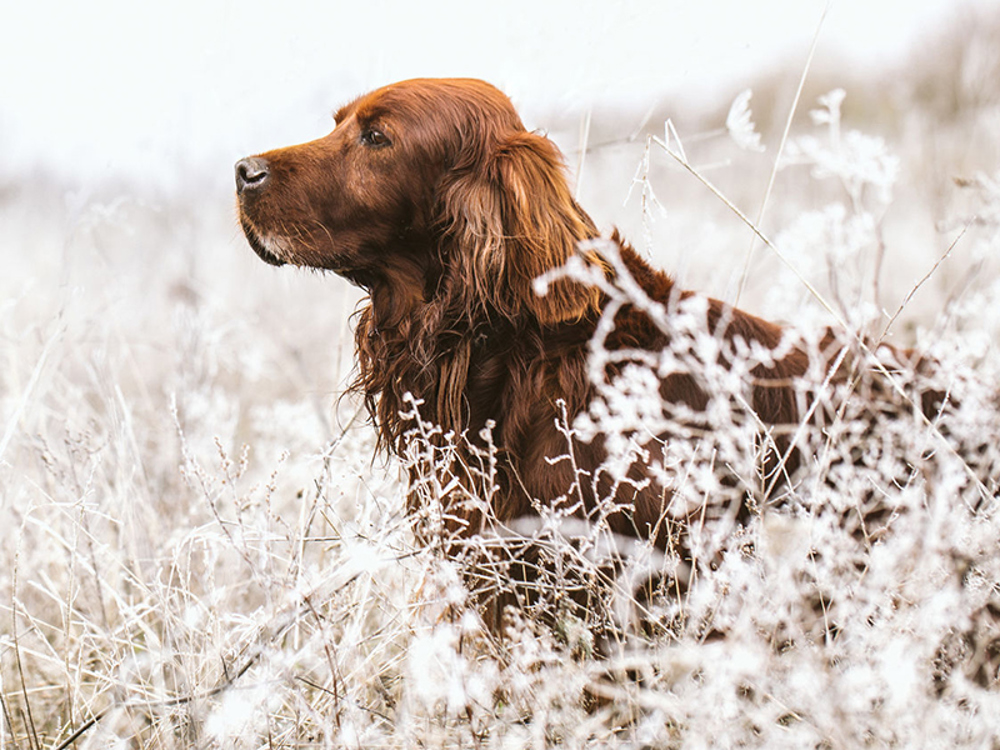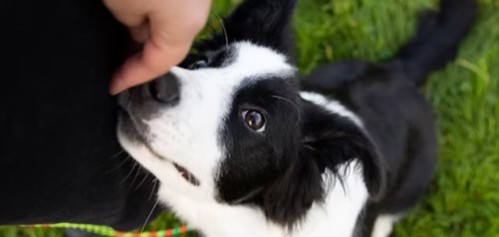
While the British weather is largely unpredictable, one thing you can rely on is that there will be a winter cold snap with early morning frosts and even some snow. Some dogs are naturals in the cold weather, whereas some will need a bit more love and care to keep them comfortable. There are several things to consider when walking dogs in cold weather, so how can you keep your best four legged friend happy this winter?
Condsider investing in winter clothing and accessories
A lot of larger or longer coated breeds have no issues with braving the cold, and it is usually fairly clear that they are perfectly happy using their own insulation to stay warm when outside. However, some smaller or short coated dogs feel cold in the winter nip, so it may be a good idea to buy a well fitting coat that will help keep them warm and dry on walks.
The dark mornings and evenings mean that you’ll most likely be taking your dog out for a walk when it is dark or gloomy, and you should think about how visible your dog is to other people when out walking in low light. Reflective collars and jackets are a good idea, and there are even some bright LED collars and tags available to help make your dog easier to see by other walkers and road users.
You should also consider the clothing that you wear on dark dog walks, as anything that will help make you more visible will keep both you and your dog safer. Hi-vis jackets will make you easy to spot in lower light levels, and taking a torch will help you see better, and will make you easier to see by others.
The best lifetime dog insurance
Protect your dog with the UK's Number 1 pet insurer, with up to £25,000 cover for vet fees.
Beware of potential dangers on walks
A thick blanket of snow can hide a lot of potentially dangerous areas which may cause harm to your dog if they are off lead. Any deep snow drifts will look almost invisible, and your dog could very easily end up in difficulty by walking into snow that is far too deep.
Ponds, lakes, and streams can freeze over and may look solid, but the thin ice layer can cover deep and potentially fatal freezing water. Your dog can very easily fall through the ice and get into difficulty, and you would put yourself in serious danger by trying to rescue them.
For both of these reasons it is a good idea to keep your dog on the lead while out on walks in the freezing weather. It may be frustrating for your dog if they are used to being walked off lead, but in the long run it is better to play it safe and keep them out of harm's way.
As the nights draw in and evenings get darker earlier, remember to keep you and your dog safe by wearing reflective clothing and using bright or reflective collars or light up leads. Road traffic accidents are common in the winter and there are a number of steps you can take to make you and your dog more visible at night. Check to make sure that your dog is microchipped and that they are wearing ID tags in case they get lost after dark.
Clean up and warm up when you get home
If your usual walking route involves walking on roads, pavements, or paths, then there is a good chance that salt has been spread on them to melt any ice and reduce the risk of anyone slipping and hurting themselves. If your walk involves any of these surfaces then you should rinse your dog’s paws with warm water when you get home, as the salt can cause skin irritation.
Some dogs with longer coats may collect snowballs on their fur as they play and roll in the snow. If this happens to your dog, try your best to dust them off as they collect on your walk, but failing that rinse them off with warm water when you get home to melt them away.
After a period of running around in the cold, your dog may initially be quite warm and panting but as soon as you get home and they cool down they can get chilly very quickly. Make sure your dog has a cosy dry space to stay warm when they get home, and if they are damp or wet check to make sure they aren’t getting too chilled as they dry off. A warm towel to lay on or a specialist moisture wicking drying coat are ideal for this.
Winter dangers to dogs
Antifreeze
Antifreeze can be extremely dangerous to dogs. It can damage their kidneys and cause death, even after only a small amount has been licked. It smells and tastes sweet, so may be irresistible to some dogs. Dogs will most often come across it after it’s leaked from a car radiator, or been spilt after refilling screen wash. If you notice any liquids by your car, keep your dog away and clean it up immediately. If they’ve walked through any, then wash their paws with soap and water straight away. If you think your dog has licked, drank or been in contact with antifreeze, contact your vet immediately. The quicker your dog is treated the better.
Find out more about the dangers of antifreeze to dogs.
Hypothermia
In very cold weather, if you’re out for a walk with your dog, it’s important that you keep a close eye on their paws. Ice and snow can stick to the fur between their pads and ball-up. Not only could this be uncomfortable for your dog, but it also increases their risk of frostbite. If your dog lifts their paws, stops walking or whines it could be a sign that their paws are too cold. When cold, a dog’s body limits blood flow to their extremities (paws, tail, ears etc.) and instead, uses it to keep their vital organs safe and warm. This protects the organs, but does put these extremities at risk of being damaged by the cold. On very cold, icy or snowy days, try to keep the time they spend outside to a minimum and consider using a coat or paw protectors to keep them warm. If you’re concerned about them having frostbite contact your vet immediately.
Frostbite
Very low temperatures and cold winds can quickly reduce your dog’s body temperature, causing frostbite and/or hypothermia. Most dogs will be fine outside as they are, but if it’s very cold, or if you’re spending a bit longer outdoors, then you might want to consider getting a coat for them and some protection for their paws. Every dog is different, but some dogs may be more at risk from cold weather, particularly small, slim, very young or older dogs, or those with short hair. If you do buy a coat make sure it fits well so that it doesn’t prevent them moving normally, either through being too tight or too loose. If you’re outside in the cold and your pet starts shivering, or appears very tired, then get them home as soon as possible. If they are very unwell, get worse or continue to be unwell, contact your vet immediately.
Arthritis
Signs of arthritis can get worse in colder temperatures, so if your dog suffers from this condition they may be stiffer, especially in the morning before they’re warmed up. If you are worried about these signs and if your dog is experiencing any pain, contact your vet.
Find out more about arthritis in dogs.
Rat and mouse poison
Rats and mice look for warmer places to stay in colder months and so more people tend to put down poisons in winter. These poisons are designed to be attractive to rodents, but may smell and taste good to your dogs too. There are many different types of rat and mouse poisons, but if you use them, make sure they are put in places where your dog can’t reach them. Always contact your vet immediately if you are concerned that they may have eaten any poisons.
Find out more about rat and mouse poison dangers in dogs.
Winter weight gain
In winter months we are often less active because of the cold wet weather and darker evenings. Getting less exercise means that it’s much easier for your dog to put on weight, so it’s important to keep an eye on their weight and size. During the winter you may need to reduce their food portions to prevent them piling on the pounds. Make sure you keep your dog healthy by taking them for regular walks and stay prepared with warmer winter accessories if required. If you’re unable to go out, keep your dog active and entertained by playing indoor games with them.
Find out more on how to help your dog lose weight.
Think your dog may be affected?
If you're worried about your dog's health, always contact your vet immediately.
We are not a veterinary organisation and so we can't give veterinary advice, but if you're worried about any of the issues raised in this article, please contact your local vet practice for further information.

